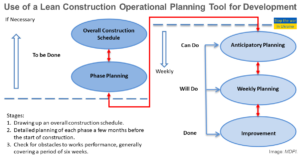Orlov, Alexandr K., and Vadim S. Kankhva. "Lean Construction Concept Used to Develop Infrastructure Facilities for Tourism Clusters". Buildings. December 29, 2021. https://doi.org/...
 Lean construction increases the efficiency of developing infrastructure facilities for tourism destinations. This study proposes the methodological approach to the implementation of megaprojects of tourism clusters based on the lean construction concept. It is to serve as the basis for organizing and planning development activities at the tactical and operational levels. The paper examines the lean construction concept for territory development and the implementation of infrastructure tourism clusters. It suggests that lean construction contributes to the improved quality of products and services, reduced costs, improved environmental component of the regions, reduced construction time, and improved image of construction companies.
Lean construction increases the efficiency of developing infrastructure facilities for tourism destinations. This study proposes the methodological approach to the implementation of megaprojects of tourism clusters based on the lean construction concept. It is to serve as the basis for organizing and planning development activities at the tactical and operational levels. The paper examines the lean construction concept for territory development and the implementation of infrastructure tourism clusters. It suggests that lean construction contributes to the improved quality of products and services, reduced costs, improved environmental component of the regions, reduced construction time, and improved image of construction companies.
Posted on 22/03/22
Recent Abstracts
What Are the CRE Credit and ESG Considerations?
ESG risk is the possibility of suffering a negative impact on a company arising from environmental, social and governance (ESG) factors. Sustainability risk (SR) is an ESG event or condition that could have a negative impact on the value of a financial product. Besides the risk of greenwashing, there are several chal ...
Posted on 24/03/21
Why sustainable procurement is key to the circular economy
The built environment – residential and commercial real estate and infrastructure development – accounts for around 13% of the world’s GDP. Research shows the construction materials comprise 50%-60% of the total cost in construction projects. When sourcing materials, companies need to consider their environmental imp ...
Posted on 24/03/21
Sustainability Linked Loan Principles Extend Green Finance
The Sustainability Linked Loan Principles published by the Loan Market Association (LMA), the Asia Pacific Loan Market Association (APLMA) and the Loan Syndications and Trading Association (LSTA) set an international baseline for determining how financing can facilitate positive corporate performance and achieving meas ...
Posted on 24/03/21
Do Online Comments Affect Environmental Management? Identifying Factors Related to Environmental Management and Sustainability of Hotels
This study identifies the key factors in the environmental management and sustainability of hotels, as perceived by travelers. It is based on a sample of the 25 best hotels in Switzerland from a TripAdvisor ranking in 2018 that draws from more than 500,000 reviews. The results highlight the key factors related to env ...
Posted on 24/03/21
How to Encourage Sustainable Tourism?
Until 2030, the World Tourism Organization (UNWTO) expects an average annual growth rate of international tourist flows of 5% per year. In this report, Horwath HTL has identified key issues and recommendations for consideration by international donors in order to target and improve the effectiveness of intervention fo ...
Posted on 24/03/21
Binder Groesswang Advises Verbund on Placement of World’s First Syndicated Loan Rated According to Sustainability Criteria
Verbund AG issued the world's first Environmental Social Governance-linked syndicated loan. Its interest rate is not determined by reference to the financial rating but by reference to a sustainability rating established and assigned by the ESG rating agency Sustainalytics. If Verbund AG's sustainability rating decre ...
Posted on 24/03/21
Competitive Intelligence and Sustainable Competitive Advantage in the Hotel Industry
Competitive intelligence (CI) is gaining significance as a process that enables companies to achieve sustainable competitive advantage. For this study, a path model was developed to empirically investigate the relationship between CI use in hospitality and the hotel industry and its background environmental and organiz ...
Posted on 24/03/21
Sustainability in the Hospitality Industry: A Social Factor Dimension
This paper empirically studies the impact of social factors on the sustainability of the hospitality industry in Qatar. Besides the social factors that influence the sustainability of any business, it shows that the most relevant factors for the sustainability of the local hospitality industry are education, life expe ...
Posted on 24/03/21
Innovative mechanism for local tourism system management: a case study
This paper studies an innovative mechanism for managing local tourism and recreation systems and offers recommendations on their development. It examines issues on local tourism system management in the Volga Federal District, Russia. It shows that the relevance of local system development is largely dictated by the lo ...
Posted on 24/03/21
OECD Tourism Papers
OECD Tourism papers address issues such as trends and policies, innovation, sustainability, skills and statistics. This series is designed to make available to a wider readership selected studies drawing on the work of the OECD Tourism Committee (www.oecd.org/cfe/tourism). It complements OECD tourism publications and ...
Posted on 24/03/21
EMEA Real Estate Market Outlook 2020
The report takes a comprehensive look at the prospects for the EMEA real estate market in 2020. It provides a cautious economic and political outlook in the region amidst weakening global trading conditions, the capital markets in light of the accommodative policies of central banks that reinforce expectation of conti ...
Posted on 24/03/21

